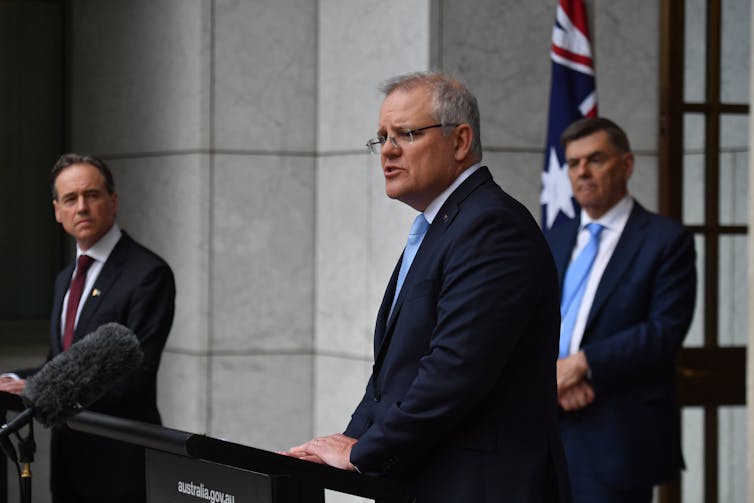What elective surgery will be allowed now the coronavirus situation has improved? It's up to your surgeon or hospital
- Written by Stephen Duckett, Director, Health Program, Grattan Institute
Australian Prime Minister Scott Morrison has announced some elective surgery can start again in private hospitals, as it becomes clear the health system will cope with the additional coronavirus demand.
He said this week “all Category 2 or equivalent procedures in the private sector, and selected Category 3 and other procedures, which includes all IVF” can restart.
What’s this mean for you? It all depends on which category you are in – and what your surgeon has decided about how urgently your surgery is needed.
It also depends on whether you are a patient in a private hospital or public hospital. If it’s the latter, you can expect to wait a while until the hospital can tell you exactly when your surgery will happen.
 Scott Morrison announced on Tuesday the ban on elective surgery would be lifted.
Mick Tsikas/AAP
Scott Morrison announced on Tuesday the ban on elective surgery would be lifted.
Mick Tsikas/AAP
Read more: Good news on elective surgery, but dire warning on the economy
Category 1, Category 2, Category 3: what’s the difference?
Private hospitals have not had elective surgery waiting lists in the past and so have not categorised patients for elective surgery. So it’s no surprise this announcement has created enormous confusion.
States have not yet announced their plans for restarting elective surgery.
Elective procedures are categorised into three categories based on urgency:
- Category 1, the most urgent, is where patients should be seen within 30 days
- Category 2 patients should be seen within 90 days
- Category 3 patients should be seen within 365 days.
Categorisation is done by the surgeon and takes into account the specific circumstances of the patient. For example, they would consider the extent of the pain and mobility loss, and the impact on the work or education if the surgery was delayed.
Different surgeons can assign patients different categories
Unfortunately, different surgeons seeing the same patient may make different assessments of what category they should be in. This policy issue needs to be addressed.
Read more: Elective surgery's due to restart next week so now's the time to fix waiting lists once and for all
There is no fixed rule about whether a particular procedure is always in a specific category.
However, generally cardiac surgery, such as a heart bypass, will be classified as Category 1. More than half of all patients awaiting this procedure are treated within three weeks.
A patient waiting for a hip replacement, on the other hand, will be typically categorised as Category 2 or 3. In fact, half the patients waiting for that procedure had to wait up to four months.
Waiting times for public hospital treatment is longer in some states and others. Data for elective surgery waiting times it is published by the Australian Institute of Health and Welfare.
 Categorisation is done by the surgeon and takes into account the specific circumstances of the patient.
www.shutterstock.com
Categorisation is done by the surgeon and takes into account the specific circumstances of the patient.
www.shutterstock.com
How do I know what category I’m in?
If you are scheduled for an operation in a private hospital, either the hospital or the surgeon will contact you.
They will let you know if your surgery is now going ahead, and discuss with you appropriate timing. Elective surgery will commence over the next week, so private hospital patients should hear from the hospital surgery within the next fortnight or so.
Because states haven’t yet revealed their strategies for restarting elective surgery, public hospital patients should not expect to hear from the public hospital until those announcements have been made.
Authors: Stephen Duckett, Director, Health Program, Grattan Institute





